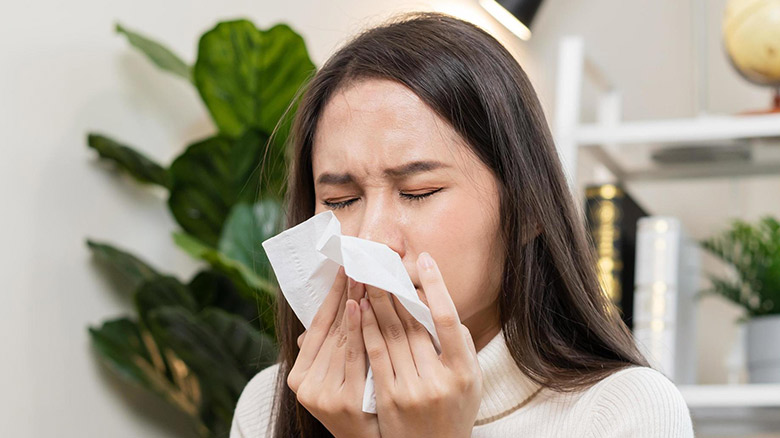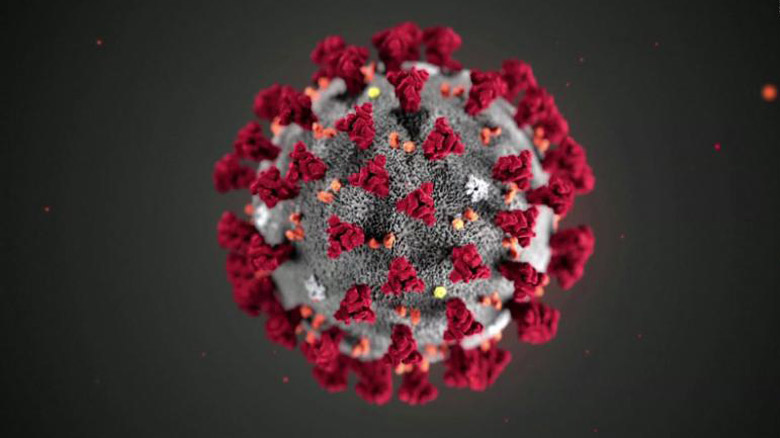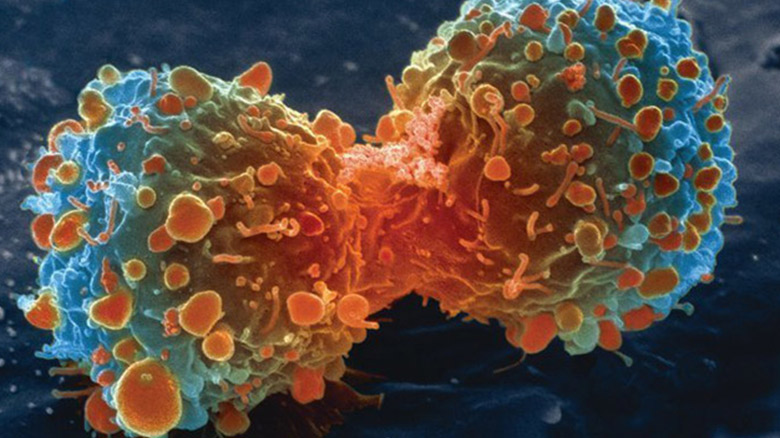
What are winter allergies?
Winter allergy symptoms are seasonal allergy due to colder weather and increase in spending more indoor time. Winter season is often seen as more indoor time with moderate to less exposure to direct sunlight leading to sneezing and running nose. Common winter allergies can get trigger due to allergies to home dust particles, pollen and air borne dust.
Symptoms:
Common signs of allergy symptoms:
- sneezing
- runny nose
- itchy ears and eyes
- sore throat
- difficulty in breathing, especially through a clogged nose
- dry cough with sometimes producing phlegm
- skin rash
- feeling sick
- low fever
Severe allergies symptoms related to asthma, such as:
- chest tightness
- wheezing or whistling during breath in and out
- rapid breathing
- feeling exhausted
- restless feeling
REASONS AND CAUSES FOR WINTER ALLERGIES
There are many reasons why winter allergens can become problematic for some people:
- Indoor Air Quality Deteriorates
The simple fact that since we spend more time indoor, the cold air keeps us inside our homes and we receive less sunlight there by increased in allergies. Indoor would keep us warm but it also leads to poor air ventilation which allows allergens (dust particles, pet fur or hair and damp) to accumulate and doesn’t gets disperse.
- Heating Systems Stir Up Allergens
Dust settled on furnace, heater etc. gets blown back to air thus causing indoor allergen to circulate in air and may irritate the respiratory system, worsening allergy symptoms. Allergens (dust particles, pet hairs and furs, dehumidifiers and damp) are easily stimulated up with the use of heating systems, which can send dust and particles floating through the air.
- Damp Growth
Fungi / mold thrives in damp and dark places, and winter provides the perfect environment for their growth. Damp towels, cloths bathrooms, base of furniture, damp flourishes in these places.
- Changes in Immune Response
For some people winter cold air directly affects the immune system, may lead to nasal irritation and inflammation, this can increase allergy symptoms. In addition, lack of direct sunlight lower vitamin D levels in winter, negatively affect immune function making the body more receptive to allergens.
- Illnesses and Sinus Infections
Winter is the season for cold, flu, and other viral infections and these illnesses increases congestion and coughing, often overlapping with allergies. This overlap can sometimes make winter allergies worse, as immune system is more susceptible to allergic responses.
MANAGE WINTER ALLERGIES
Though winter allergies may seem unavoidable, but there are several ways to manage symptoms, reducing exposure to allergens and adopting preventive measures, one can minimize the severity of winter allergy symptoms and improve life.
Try the following to minimize your exposure to indoor allergens common during the winter:
- Keep Home Clean
Put special protective covering over bedding, including pillows and mattresses, to keep dust particles out. Regularly vacuuming carpets, rugs and upholstery with a vacuum cleaner that has a HEPA filter which can help remove dust and pet furs or hairs. Regularly wash your clothes, bedding, curtains and any removable upholstery covers in hot water to reduce pet furs or hairs and dust particles build-up. Pay special attention to areas where dust tends to settle down, such as baseboards, vents and behind furniture.
- Use High-Efficiency Dehumidifier and Air Filters
Use dehumidifier to reduce moisture in indoor air. Also a high-efficiency particulate air (HEPA) filter in HVAC system can help capture dust, mould spores, and pet furs or hairs in the air. Can also use a portable air purifier in bedroom or other living areas to reduce airborne allergens. Change air filters regularly to maintain good air quality.
- Keep Windows Closed
This will help prevent cold outdoor air from entering your space. Additionally, avoid drying clothes outside, as pollen and other allergens can get stick. Fix leaks in your bathroom, roof, or pipes to stop moisture from building up and creating a germinating environment for dust particles, damp to thrive.
- Practice Good Hygiene
Wash hands regularly and if sick, use tissues to cover while sneezing and coughs. Disinfect frequently touched surfaces, like doorknobs and light switches.
- Limit Exposure to Pets
If you have pets that shed flakes of skin or fur or hair, try to keep them out of your bedroom and wash their bedding regularly. Clean up any leftovers or crumbs food in your kitchen or dining area after you or your pets eat.
- Consider Allergy Medication
In some cases, over-the-counter antihistamines, decongestants, or nasal corticosteroids may help alleviate winter allergy symptoms. Consult your doctor before using any medication, as they can recommend the best treatment based on your specific allergies and health conditions.
AYURVEDA TREATMENT
Treating allergies using the holistic Ayurvedic approach includes treating the root cause of the allergy, rather than merely addressing the common symptom. That is why Ayurvedic treatment offers unique approach to achieve long-lasting benefits and relief from allergies.
Balancing the Doshas
The symptoms of specific diseases (e.g. allergies) depend on the Dosha that is aggravated the most. Ayurveda focuses on balancing the Doshas. Three Doshas (Kapha, Pitta and Vatta), any imbalance in either one or more of these Doshas may lead to allergic conditions.Kapha Doshas – Allergy Symptoms
In Ayurveda, the growth of the Kapha Dosha, which is made up of earth and water elements, is considered to be responsible for the allergy symptoms during the dry season which brings allergens- nasal congestion, runny nose, watery eyes and sneezing. Further, it can also cause heaviness in the stomach and slow digestion.There are several effective treatments that help relieve acute Kapha allergy symptoms include:
- The traditional nasal cleansing also known as Jalneti, is a self-practice which involves clearing the nasal passages with salt water with a Neti Pot.
- The use pungent-bitter herbs and spices including ginger, cayenne, pepper, basil, cumin, cardamom, sage, turmeric, and cinnamon to reduce Kapha Doshas.
- Drinking hot honey water, or ginger lemon tea.
- Trikatu, which can be taken daily is an Ayurvedic herbal medicine to reduce Kapha Doshas.
- Daily exercise.
Pitta Doshas – Allergy Symptoms
Pitta is governed by elements of water and fire producing excess heat which may produce inflammation in the respiratory tract and or skin. Pitta imbalance leads to allergies to hot and spicy foods, citrus fruits, fermented foods, and vegetables like potato and tomato.To calm and cleanse Pitta and its resulting allergy symptoms:
- Ayurveda recommends incorporating cooling herbs, such as coriander and cilantro into your diet.
- Herbs such as guduchi, amalaki, and neem have proven to be helpful.
- Drink cool juices prepared from natural ingredients.
- Ingestion of aloe, can calm the inflammatory reaction that is a common result of an imbalanced Pitta Doshas.
Vata Doshas – Allergy Symptoms
Vata Doshas are experienced in the digestive system which can also lead to allergic symptoms like headache, continuous wheezing and sneezing, dry cough, dry eyes, joint pain, muscle spasms, and insomnia.Ayurveda recommends for Vata Doshas:
- It is important to stay hydrated and drink warm liquids, such as ginger tea with honey or licorice tea.
- To balance the Vata, use ashwagandha which calms the immune system’s response to allergens.
- Eat cooked vegetables and avoid vegetables like broccoli, cabbage, cauliflower, dark leafy greens, and most beans even in cooked form.
- Eat foods like rice pudding, bananas, hot cereals, root vegetables, and pureed soups.
A few habits to practice which in turn will help reduce your symptoms are:
- Avoid cold or frozen foods, carbonated beverages, and leftover foods.
- Consume cabbage, broccoli, cauliflower, and dark leafy vegetables, shouldn’t be overcooked.
- Avoid heavy foods and drinks, including dairy, wheat, meat, sugar, processed foods, and iced beverages, as they can slow down digestion and dampen the agni (digestive fire).
- Make freshly cooked food, including foods that are light, dry and warm.
- Avoid junk food and sweets.
- Include plenty of fresh fruits and vegetables, and a good variety of legumes.
- Take Trikatu before meals to heat up the agni (digestive fire).
- Develop a daily pranayama routine.
FREQUENTLY ASKED QUESTIONS
Winter allergies worsen due to increased indoor allergens like dust mites, pet flakes of skin or fur or hair, and damp.
Yes, damp thrives in poorly ventilated areas.
Yes, dry air may irritate nasal passages, making allergies worse.
Consult a doctor for more personalized treatments.
Limit exposure to pets, regularly clean pet bedding and use air purifiers to reduce flakes of skin or fur or hair.
Yes, viral illnesses can make allergy symptoms worse due to an overactive immune response.
If symptoms persist or worsen despite medication, or if you have breathing difficulties, consult your doctor for further treatment.



